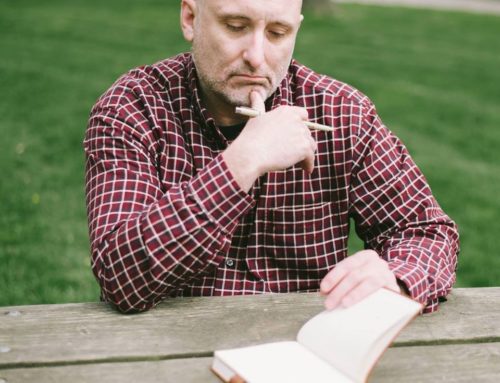“… the jar he was making did not turn out as he hoped, so he crushed it into a lump of clay again and started over.” (Jeremiah 18.4, NLT).
Some months after I was diagnosed with bipolar disorder, I returned to work as a pastor. It was difficult at first, but with much prayerful support, our ministry became fruitful. People who had hidden mental health issues for fear of judgment, now confided in me and together we grew in grace, offering our whole selves in worship and outreach among those who sought healing for body, mind, and spirit.
I was asked to serve as a mentor for students preparing for pastoral ministry. One weekend, they brought together mentors throughout the state for training on how to best equip persons for service in what can be a consuming career. Many topics were addressed: spiritual growth, emotional well-being, financial fitness, etc.
During one brainstorming session, we laid out some situations that had been particularly difficult to resolve. One mentor spoke up:
“We just discovered one of our candidates has bipolar disorder and we’re looking for a way to gently dismiss him from pursuing ministry.”
I held my tongue for some time. The conversation advanced from bipolar disorder to other psychological issues and back again. The general consensus of the group was that we need to restrict pastoral service from those emotionally flawed.
Finally, I spoke up,
“If we are honest with ourselves, we all have psychological issues. Personally, I’ve been diagnosed with bipolar disorder. This does not prevent me from faithful service. We need to steer clear of judging people on the basis of labels and instead look at the character of their behavior.”
We should not discriminate on the basis of diagnosis but on the grounds of behavior. Some persons with bipolar are prone to sexual promiscuity which could include infidelity, addiction to pornography, even non-consensual sexual contact or exposure. These persons need to be firmly disciplined and, if not rehabilitated, dismissed from service. Other persons with bipolar become so obsessed with spending on frivolous things that they go in massive debt and engage in unethical behavior to get out. Such persons should pay their debts and be forced to take a leave. These sins/crimes can be committed by anybody. We should not treat persons with bipolar any differently simply because they have bipolar.
Can someone with a severe mental illness serve faithfully as a pastor? Absolutely, though not always. For many of us, the stress of ministry is so great that we become unable to perform our duties while juggling the stress of our illness. With much support from our families, friends, and church, we can succeed, but not always. Sometimes our illness progresses to the point of needing to step away and engage in another vocation.
Pastoral ministry is a hard row to hoe and it is even harder for someone with a mental illness. I encourage everyone who does persist in pursuing a call to use due diligence and seek the advice and oversight of trusted supervisors. The worst thing we can do is to keep our diagnosis a secret. The second worst is to publicly disclose in such a way that we become dependent on our church to take care of us. It is a tough balance to wrestle with issues of mental illness without further smashing our cracked pots.
Can someone with a serious mental illness serve faithfully as a pastor? What do you think?
Prayer: Father, I am a cracked pot in your hands. Mold me into one that overflows with your abundant grace to share with others.
Discover more from Delight in Disorder
Subscribe to get the latest posts sent to your email.









Tony, I’m a bipolar II survivor. Judgment abounds in church about mental illness (and other things). As you mentioned in your comment on my blog, I have a passion for writing about injustice. I also wrote about my own bipolar journey at https://susanirenefox.com/2016/10/24/coming-out-of-the-closet/
The more of us who are willing to disclose our condition – especially those of us who follow Christ – the sooner the stigma and shame will be lifted. We are sons and daughters of an amazing, loving and gracious Father who welcomes us with open arms. We are all imperfect jars of clay. Rather than condemnation, I believe we are here to lift each other up in love, inclusion and compassion.
Thank you for your courage.
Susan,
You clearly have a mature faith that has carried you through hard times. I look forward to reading more of your writings and perhaps sharing more of your story here on Delight in Disorder.
Tony, I love the scripture you shared in this post. Twice I started seminary at Fuller and twice I quit — once due to the stress of moving, once due to the stress of my husband losing his job during the recession. I decided that God calls me to a mental health ministry, but not to the ordained ministry — at least for now. I believe that the pastoral demands on an ordained minister can be overwhelming for anyone, especially for someone with mental illness, but that’s not to say that it’s impossible. If the role was shared, and a pastor could preach or counsel with assistance, then I can see it as more manageable. The issue for me is one of boundaries and self-care.
God clearly had a ministry for you, Kitt, that you are fulfilling quite well. You are right that it took a great deal of cooperative support for me to be part of a thriving ministry. And as this cooperation eroded (with various moves) and my illness progressed, I accepted the reality that I am no longer suited for pastoral ministry. But I have found great satisfaction in writing and connecting the faith community with the mental health world.
Thanks for your words, Kitt. And keep up the faithful ministry!
Hi Tony,
Thanks for thinking of me. Although I personally have stopped blogging for the more conventional writing of my memoirs I have thought of you many times since our last communications.
As you may remember my son, now 38 has bi-polar and could really use some help from above. I am of the belief that if he gets that area of his life sorted the rest will eventually follow with much better results.
I will try and read some of your more later posts to see what I have been missing.
God bless you Tony. You are shining light in the midst of darkness. You are a testimony to those who suffer from debilitating mental health issues. Most of us struggle to live in one world you have managed, with the help of our God to live with yourself in two worlds.
Keep going for God Tony.
Cheers, Sam
Sam, you have been an inspiration for me with your encouraging words. I will certainly keep your son in my prayers. Keep me posted on your memoirs.
I think any vocational success depends on the individual’s limitations and level of mood stability when it comes to mental illness, as many disorders are cyclical by nature not just bipolar. In my limited perspective, I have the opinion that these illnesses tend to become more debilitating as one ages as well, which is something else to consider.
Great new site, Tony. Thanks for letting me know about it.
Excellent points. I have certainly found this to be true. What I was able to do at 32, I am not able to do at 52. Thanks for weighing in.
Good points, my friend. I know there are many things I could do in my 30s, before my illness worsen, than I can do now. I can’t fathom attempting to navigate my illness with a full-time job. Fortunately, writing is part of my therapy. It doesn’t put much food on the table, but it is spiritually nourishing.
You make an excellent point regarding quality of character.
The very word “minister” implies that the effective Christian leader is dedicated to being a servant first.
Brokenness is a requirement of faithful service, is it not? God works most visibly through those who are humble enough to admit their need of Him and available to do His will .
The only caution I can think of is if a psychological struggle interferes with one’s ability to control impulses of violence or leads to unsound theological thought processes. That said, accountability and group support is always important, even for those who do not experience such difficulties.
Very true. Misconduct and heresy are reasons to restrict or remove from service. Your words remind me of Henri Nowen’s concept of “Wounded Healer.”